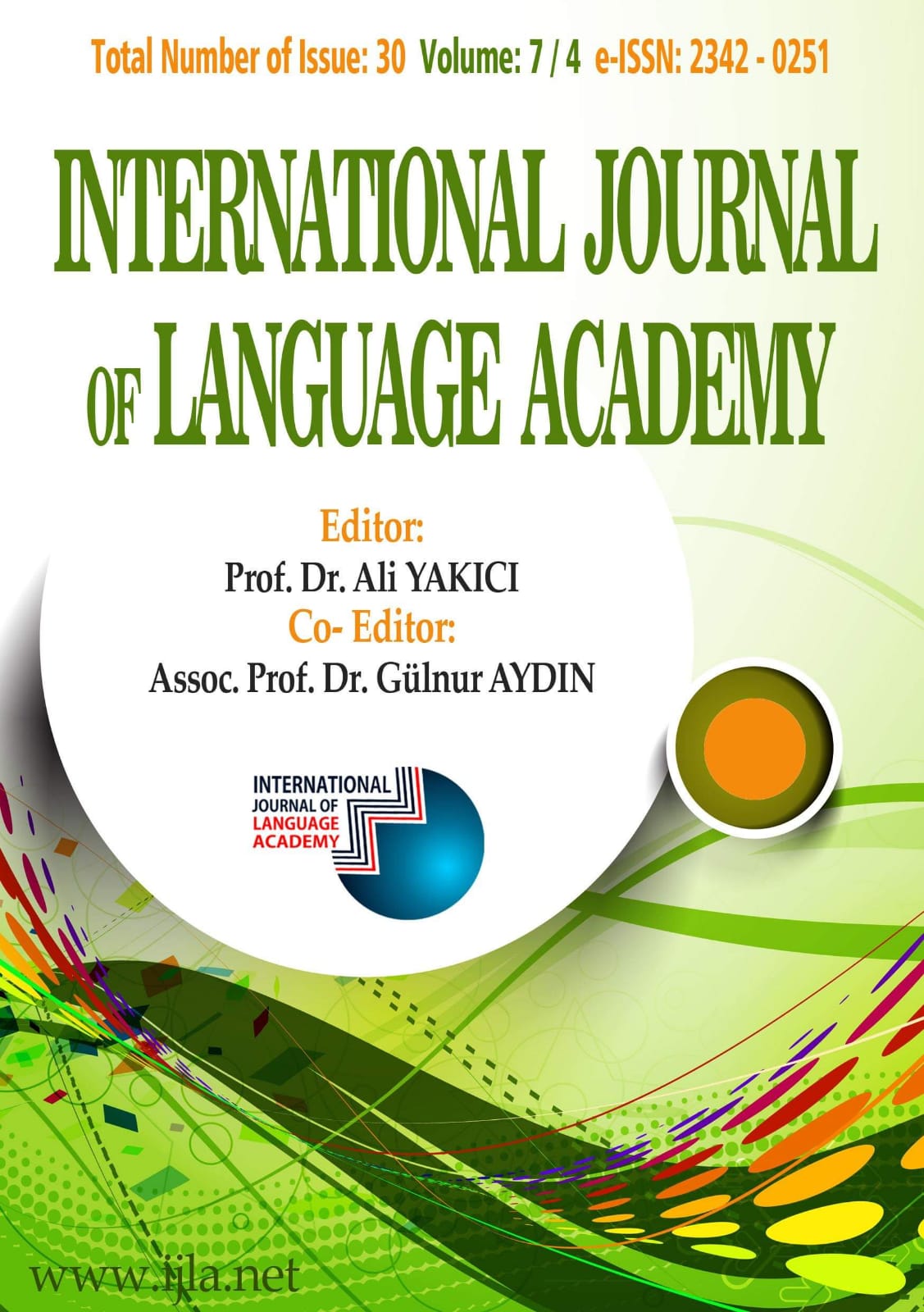Türkçeyi Yabancı Dil Olarak Öğretenlerin Teknolojiye Yönelik Tutumlarının Belirlenmesine İlişkin Bir Ölçek Geliştirme Çalışması
Author :
Abstract
Bu çalışmanın amacı, Türkçeyi yabancı dil olarak öğretenlerin teknolojiye yönelik tutumlarının belirlenmesinde kullanılabilecek bir ölçme aracı geliştirmektir. Bu amaçtan hareketle geliştirilen 47 maddelik denemelik formun uzman görüşü alınarak kapsam geçerliği sağlanmış, ardından Yunus Emre Enstitüsü, üniversitelerin dil merkezleri (DİLMER, TÖMER), resmî okullar (PICTES, seçmeli ders) ve özel kurslarda Türkçeyi yabancı dil olarak öğreten 302 kişiye uygulanmıştır. İlk uygulamadan elde edilen veriler ile Açımlayıcı Faktör Analizi (AFA) yapılmış, ölçeğin yapı geçerliği test edilmiştir. AFA sonucunda 30 maddeden oluşan, kaçınma, isteklilik ve benimseme olarak adlandırılan 3 faktörlü bir yapı belirlenmiştir. Bu 3 faktörün (1. faktör %30,960, 2. faktör %26,233, 3. faktör %7,134) açıklanan varyansın %64,327’lik kısmını karşıladığı görülmüştür. Sonraki aşamada maddelerin yapı geçerliğini doğrulamak için ölçek formu 191 kişilik farklı bir guruba gönderilmiş, elde edilen verilerden hareketle doğrulayıcı faktör analizi (DFA) yapılmıştır. Yapılan AFA ve DFA ile 30 maddelik nihai ölçek formunun yapı geçerliği doğrulanmıştır. Ölçeğin güvenirlik çalışmaları ise ölçeğin tamamı ve alt faktörleri için hesaplanan iç tutarlık katsayıları ile belirlenmiştir 30 maddelik ölçeğin tamamı için Cronbach alfa güvenirlik katsayısı 0,91 iken; birinci faktöre (kaçınma) ait α değeri 0,95, ikinci faktöre (isteklilik) ait α değeri 0,91 ve üçüncü faktöre ait α değeri 0,89 olarak bulunmuştur. Yapılan analizler sonucunda ölçeğin geçerliği ile iç tutarlılığının yüksek düzeyde olduğu görülmüş ve Türkçeyi yabancı dil olarak öğretenlerin teknolojiye yönelik tutumlarını geçerli ve güvenilir bir şekilde ölçtüğü ortaya çıkmıştır.
Keywords
Abstract
The aim of this study is to develop a measurement tool that can be used to determine the attitudes of those who teach Turkish as a foreign language towards technology. Based on this aim, the content validity of the 47-item trial form obtained by taking expert opinion, then, was applied to 302 people teaching Turkish as a foreign language in Yunus Emre Institute, language centers of universities (DİLMER, TÖMER), state schools (PICTES, elective course) and private courses . Exploratory Factor Analysis (EFA) was performed with the data obtained from the first application and the construct validity of the scale was tested. As a result of the EFA, a 3-factor structure consisting of 30 items called avoidance, willingness and adoption was determined. These 3 factors (1st factor 30,960%, 2nd factor 26,233%, 3rd factor 7,134%) were found to cover 64,327% of the explained variance. In the next stage, the scale form was sent to a different group of 191 people to confirm the construct validity of the items, and confirmatory factor analysis (CFA) was performed from the data obtained. The structure validity of the 30-item final scale form was confirmed by the EFA and CFA. The reliability studies of the scale were determined by internal consistency coefficients calculated for the whole scale and its sub-factors. The Cronbach's alpha reliability coefficient for the whole 30-item scale was 0.91; α value of the first factor (avoidance) was found 0.95, α value of the second factor (willingness) was found 0.91 and α value of the third factor was found 0.89. As a result of the analysis, it was found that the validity and internal consistency of the scale were high and it emerged that it measured the attitudes of those who teach Turkish as a foreign language towards technology in a valid and reliable way.
Keywords
- Anderson L.W. (1988). Attitudes and their measurement. In Keeves, J.P. (Ed.), Educational research, methodology and measurement: An international handbook. New York: Pergamon Press.
- Brown, T. A. (2015). Confirmatory factor analysis for applied research. (2th ed.). New York: Guilford Press.
- Byrne, B. M., Shavelson, R. J., & Muthen, B. (1989). Testing for the equivalence of factor covariance and mean structures. The issue of partial measurement invariance. Psychological Bulletin, 105, 456–466.
- Comrey, A. L. & Lee, H. B. (1992). A first course in factor analysis (2th ed.). New Jersey: Lawrence Erlbaum Associates.
- Demirel, Ö. (2001). Eğitim terimleri sözlüğü. Ankara: Pegem.
- DeVellis, R. (2003). Scale development: theory and applications (2nd ed.). Thousand Oaks, A: Sage.
- DeVellis, F. R. (2014). Ölçek geliştirmede kuram ve uygulamalar. (T. Totan, Cev.). (3. Baskı). Ankara: Nobel.
- Engel, K. S., Moosbrugger, H. & Müller, H. (2003). Evaluating the fit of structural equation models: Tests of significance and sescriptive goodness of fit measures. Methods of Psychological Research Online, 8 (2), 23 – 74.
- Field, A. (2005). Discovering statistics using SPSS (2nd ed.). London: Sage.
- Erkuş, A. (2003). Psikometri üzerine yazılar. Ankara: Türk Psikologlar Derneği.
- İnceoğlu, M. (2011). Tutum, algı, iletişim. Ankara: Siyasal Kitabevi.
- Kaiser, H. F. (1974). An index of factorial simplicity. Psychometrika, 39, 31-36. doi: 10.1007/BF02291575.
- Kass, R. A., & Tinsley, H. E. A. (1979). Factor analysis. Journal of Leisure Research, 11, 120-138.
- Kline, R. B. (2010). Principles and practice of structural equation modeling. (2th Ed.). New York: The Guilford Press.
- Orhan, B., ve Kan, A. (2018). Toprak sahiplerinin mevsimlik tarım işçilerine yönelik tutum ölçeği geliştirme çalışması. Marmara Coğrafya Dergisi, (37), 94-102.
- Özgüven, İ.E. (2011). Psikolojik testler. Ankara: Pdrem.
- Özüdoğru, H. Y., Kan, A., Yaman, E., & Uslu, L. (2018). Yerel halkın Suriyelilere yönelik tutum ölçeği geliştirme çalışması. Sosyal Politika Çalışmaları Dergisi, 18(40/2), 115-140.
- Pallant, J. (2001). SPSS survival manual. Maidenhead: Open University Press.
- Sarıçoban, A., Bakla, A. (2012). Yabancı dil eğitiminde teknoloji kullanımı. A. Sarıçoban ve Z., M., Tavil (Ed.), Yabancı dil öğretiminde öğretim teknolojileri ve materyal tasarımı içinde (s. 59-78). Ankara: Anı.
- Şimşek, N. (2002). Derste eğitim teknolojisi kullanımı. (2. Baskı). Ankara: Nobel.
- Tavşancıl, E. (2018). Tutumların ölçülmesi ve spss ile veri analizi. Ankara: Nobel.
- Tavşancıl, E. ve Keser, H. (2002). İnternet kullanımına yönelik likert tipi bir tutum ölçeğinin geliştirilmesi. Eğitim Bilimleri ve Uygulama, 1(1), 79-100.
- Türk Dil Kurumu (2012). Yazım kılavuzu. Ankara: TDK Yayınları.
- Türkçe Bilim Terimleri Sözlüğü. (20.04.2019) Teknoloji. Erişim adresi: http://www.tubaterim.gov.tr/.
- Vural, B. (2003). Eğitim-öğretimde teknoloji ve materyal kullanımı. İstanbul: Hayat.





